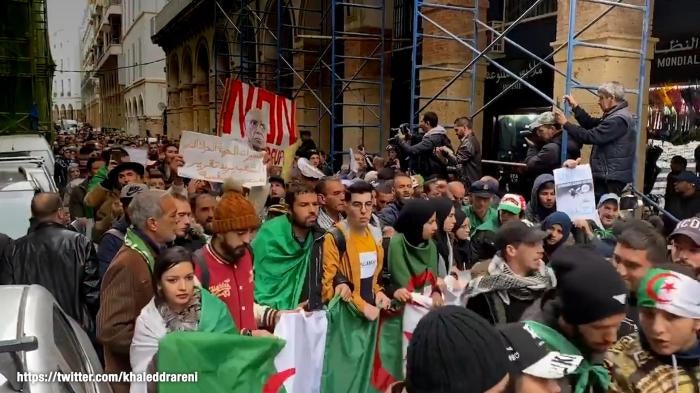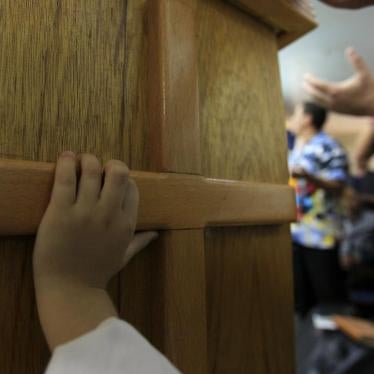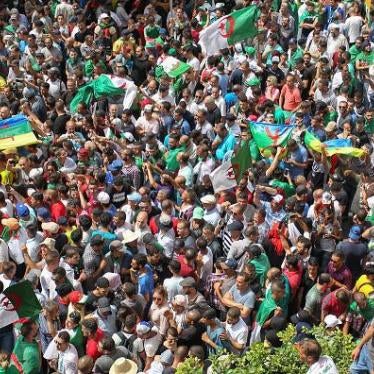(Beirut) – Algerian authorities have arrested scores of pro-democracy movement activists since September 2019. Many remain detained on vague charges such as “harming national unity” and “undermining the morale of the army.” The authorities should immediately and unconditionally release the peaceful activists and respect the rights to free speech and assembly of all Algerians.
“This spate of arrests looks like part of a pattern of trying to weaken opposition to Algeria’s interim rulers and their determination to hold presidential elections on December 12,” said Sarah Leah Whitson, Middle East and North Africa director at Human Rights Watch. “The authorities are claiming that the planned elections usher a new era of democracy in Algeria, but there is nothing democratic about this widespread crackdown on critics.”
A protest movement known as the Hirak in Arabic initially came together in February to oppose President Abdelaziz Bouteflika’s plan to seek a fifth term, and has maintained its momentum with huge demonstrations every Friday calling for the ouster of the existing government and a more pluralistic and inclusive framework to prepare for free elections. Authorities initially tolerated the protests, but beginning in June started arresting groups of protesters, including at least 40 for brandishing the Amazigh flag, a symbol of that ethnic group that, until then, had been tolerated.
The authorities prosecuted some prominent Hirak figures such as Lakhdar Bouregga, a veteran of Algeria’s independence war, starting in June, and have intensified the crackdown since September. The authorities have filed charges against the movement’s leaders such as threatening state security, national unity, and territorial integrity, calling for an illegal gathering, and undermining army morale. At least 13 of these leaders are in pretrial detention while others are free pending trial.
President Bouteflika resigned on April 2, two weeks before a planned presidential election that was then postponed. Senate President Abdelkader Bensalah replaced him, and authorities set a new election for July 4, then postponed it again. On September 15, Bensalah announced that the vote would be held on December 12.
Since Bouteflika’s resignation, one of his appointees, Ahmed Gaid Salah, 79, the army chief of staff and deputy defense minister, has been widely considered Algeria’s leading decision-maker. Gaid Salah has publicly lambasted the protest movement. On September 18, shortly after the announcement of the new election date, Gaid Salah said that a criminal gang with malevolent intentions was trying to prevent elections and gave the security forces full authority to protect the electoral process from a “conspiracy.”
On October 10, the authorities arrested Abdelouhab Fersaoui, president of Youth Action Rally (Rassemblement Action Jeunesse, RAJ), an association active in the protest movement. He is in Harrach prison in Algiers with nine other association members, including one of its founders, Hakim Addad.
Military intelligence arrested Karim Tabbou, a leading opposition figure, on September 26. He is the former general secretary of the prominent opposition party the Socialist Forces Front (Front des Forces Socialistes, FFS) and currently head of an unrecognized party. He is in Kolea prison, awaiting trial on charges of harming national interest and recruiting mercenaries on behalf of foreign powers.
On September 16, police arrested Samir Belarbi, and two days later Fodil Boumala, Hirak leaders who speak regularly in national and international media. Officials transferred them to separate courts in Algiers and charged them with “compromising the integrity of the national territory” and “distribution of documents harmful to the national interest,” under articles 79 and 96, respectively, of the penal code.
The authorities have also targeted journalists who have covered the protests. Said Boudour, a journalist from Oran and a member of the Algerian League for the Defense of Human Rights and Mustapha Bendjama, editor-in-chief of the Annaba-based daily newspaper Le Provincial were arrested and later released pending trial.
Police reports in the court files of some of these cases show that a special brigade on electronic crimes has been monitoring the social media activities of some of the movement’s leaders. The monitoring reports form the basis for vaguely worded charges of harming state security or undermining national unity.
On November 11, the court of Sidi M’hamed in Algiers opened the trial of 42 activists under the charge of “compromising the integrity of the national territory” under article 79 of the penal code for brandishing the Amazigh flag, said Kaci Tansaout, a spokesperson for the National Committee for the Liberation of Detainees, an organization created on August 26 by activists and lawyers to defend prisoners arrested during the protests.
Detained Activists
On October 10, Abdelouhab Fersaoui, president of RAJ, a nongovernmental organization heavily involved in Algeria’s protest movement, attended a sit-in in front of the Sidi M’hamed courthouse in Algiers in solidarity with those arrested for their peaceful views. Shortly before the end of the gathering, a group of plainclothes policemen arrested Fersaoui, his lawyer Sofiene Ikken told Human Rights Watch.
Ikken said the police report states that Fersaoui was placed under police surveillance because he wrote Facebook posts and participated in protests calling for a regime change and for a democratic transition. The police indicated that his Facebook posts demanding the release of prisoners of opinion and a period of transition before any election and supporting a general strike in Bejaia, and several interviews on national and international TV in which he criticized the army and the judiciary were evidence of his endangering state security and inciting against the authorities.
The Research and Investigation Brigade (Brigade de Recherche et Investigation) investigated Fersaoui on the day of his arrest and transferred him to a prosecutor in the First Instance Court of Sidi M’hamed. He was charged with “compromising the integrity of the national territory,” punishable by a prison term of 1 to 10 years under article 79 of the penal code, and “hampering the transport of military material” to harm state security, punishable by up to 10 years in prison under article 74 of the penal code. An investigative judge from the same court ordered his detention the same day at the Harrach prison.
The authorities arrested nine additional members of RAJ in September and October. On September 13, police arrested Kheireddine Medjani and Wafi Tigrine at a cafe in Algiers shortly before the beginning of a Friday protest. On September 26, police arrested Ahcene Kadi and Karim Boutata in Algiers and transferred them to the First Instance Court of Sidi M’hamed. On October 4, authorities arrested Hakim Addad, founder of RAJ, as well as Djalel Mokrani, Kamel Ould Ouali, Ahmed Bouider, and Massinissa Aissous during a peaceful protest.
A prosecutor at the Sidi M’hamed First Instance Court charged all nine with calling for an illegal gathering under article 97 of the penal code and harming the integrity of the national territory under article 76 of the penal code, their lawyer Abderrahmane Salah told Human Rights Watch. An investigative judge ordered them held at the Harrach prison.
Army intelligence arrested Karim Tabbou, national coordinator of the unrecognized party the Democratic and Socialist Union (Union démocratique et sociale, UDS) and former general secretary of the prominent opposition party the Front of Socialist Powers (FFS), on September 12 at his home in Douera, in Algiers Province.
An investigative judge in the Kolea Court in the Tipaza Province ordered his detention on a charge of “undermining the morale of the army,” punishable by up to 10 years in prison under article 75 of the penal code. The accusation stems from a lecture that Tabbou gave on May 9 in the city of Kherrata calling for a democratic transition in Algeria and criticizing the overwhelming power of the army outside of its constitutional prerogatives, said his lawyer, Abderrahman Salah. On September 25, the accusation chamber of the Kolea First Instance Court ordered Tabbou’s provisional release pending trial.
The army intelligence services rearrested Tabbou in Douera on September 26 and transferred him before the prosecutor of the Sidi M’hamed Court, who ordered his detention on charges of “recruiting mercenaries on behalf of foreign powers in Algeria” and distribution of flyers or other publications that could harm national interest under articles 76 and 96 of the penal code, respectively. His lawyer Noureddine Ahmine said the accusations stem from his Facebook publications and his speeches critical of the army’s role during the protests, as well as his trips outside of Algeria to participate in meetings about the Hirak movement.
On October 18, Tabbou appeared before a Sidi M’hamed investigative judge, who interrogated him and confirmed his detention order. Tabbou remains in the Kolea prison pending his trial, which has not been scheduled.
On September 18, police in civilian clothes arrested Fodil Boumala, a journalist and political activist, at his home in Algiers. Boumala has been active in the Hirak movement since it started. He gave several interviews to national and international television outlets denouncing the continuing grip on power of those who have governed the country. On September 14, he addressed crowds participating in the 30th Friday of protest, in which he expressed the “determination of the people in Algeria to change the regime peacefully.”
His lawyer, Noureddine Ahmine, said that police interrogated Boumala about his Facebook postings. The following day, they took him to the First Instance Court of Dar El Beida in Algiers Province where a prosecutor charged him with “compromising the integrity of the national territory” and “distribution of documents harmful to the national interest” under articles 79 and 96 of the penal code, respectively. Ahmine said that the police report in his case file shows Boumala’s publications on social media were under surveillance from a “special brigade on electronic crimes” which held that his Facebook postings supporting hirak and calling on people to take to the streets to bring down the government proved that he is part of “a criminal gang” aiming to harm national security and Algeria’s national unity.
The investigative judge of Dar El Beida Court ordered Boumala’s detention at the Harrach prison. On October 6, the accusation chamber of the appeals court of Algiers confirmed his pretrial detention.
On September 16, security services arrested Samir Belarbi in an Algiers cafe. He had expressed fierce opposition to the elections and called for the departure of “all symbols of the regime” during speeches at the Friday protests and on national TV. Police jailed him overnight and took him to the First Instance Court of Bir Mourad Rais in Algiers on September 17. A prosecutor charged him with “compromising the integrity of the national territory” and “distribution of documents harmful to the national interest” under articles 79 and 96 of the penal code, respectively. An investigative judge ordered his detention at the Harrach prison.
Activists Arrested and Released Pending Trial
On October 24, police forces in Oran arrested Kaddour Chouicha, president of the Oran section of the Algerian League for the Defense of Human Rights. They released him the same day pending further investigations. He told Human Rights Watch that he was participating in a sit-in in front of the Cité Djamel Court in Oran. At around 10:30 a.m., he left the sit-in and went to his car to retrieve a banner expressing solidarity with prisoners of opinion in Algeria.
When he arrived at his car, three men in civilian clothes arrested him and took him to a police station in Oran. An officer informed him that he was under investigation for “participation in an unarmed gathering” and “distribution of documents harmful to the national interest.” Chouicha said he refused to answer their questions or sign a police report. They released him at around 6 p.m. after confiscating his phone.
On October 6, security forces arrested Said Boudour, the journalist from the Algerian League for the Defense of Human Rights.
His lawyer, Mohamed Ferid Khemisti, said that security forces arrested him on the street in Oran and took him to a police station where they interrogated him about his Facebook posts. They jailed him overnight and then took him to the First Instance Court in Oran where a prosecutor charged him with “undermining the morale of the army in order to harm state security,” “compromising the integrity of the national territory,” and “defamation of state institutions” under articles 75, 79, and 146 of the penal code. The accusations stem from Facebook posts he made since March in which he denounced the army for meddling in political affairs, his lawyer said.
An investigative judge of the same court released Boudour pending trial. On October 15, the accusation chamber of the appeals court in Oran ordered his detention, but he remains free.
On October 23, police in Annaba arrested Mustapha Bendjama, editor-in-chief of the journal Le Provincial. Bendjama has covered the protest movement in Annaba on social media. His newspaper published articles and commentary critical of the political establishment and supportive of the protest movements’ demands.
Bendjama told Human Rights Watch that security forces came to his office at Le Provincial, seized his smartphone, laptop, and desktop, handcuffed him, and took him to a police station in Annaba. They interrogated him about a leaked document he had published two days earlier on his Facebook page. He said he had only shared this document, which was already available on other Facebook pages. The document is purportedly a directive from the national intelligence services to the head of security in Annaba to monitor certain journalists who are active in the Hirak movement.
Bendjama said police officers also interrogated him about a Facebook post from March calling on the army to stand with Algerians and to help them keep the movement peaceful. The police jailed him overnight and then took him to the First Instance Court in Annaba where a prosecutor charged him with “disclosure of information that could harm national defense” and “undermining the morale of the army” under articles 69 and 75 of the Algerian Penal Code, respectively. The prosecutor provisionally released Bendjama, who said they did not return his laptop and smartphone.









